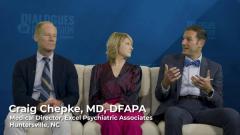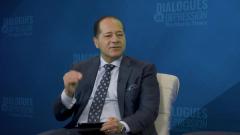
Hopeful Horizons: The Potential of Rapid Acting Therapies in MDD
Clinicians discuss the particular benefits of rapid-acting agents for major depressive disorder (MDD), highlighting the gap glutamate-modulating agents fill in targeted therapies.
Episodes in this series

Transcript
Gus Alva, MD, DFAPA: From your perspective, what benefits do rapid-acting therapies offer in addressing the specific challenges associated with major depressive disorder and its management?
Erin Crown, MHS, PA-C: I think I hit on that a little bit earlier. Again, just thinking about the severity of the illness and the implications in the life of the human being. I don’t talk about depressed patients. I don’t talk about schizophrenic patients or bipolar patients. I talk about people living with major depressive disorder and living with schizophrenia and living with bipolar disorder because I think it’s really important to place that emphasis on their life and to destigmatize that labeling situation that so often occurs and hinders sometimes the seeking of treatment because of that concern for the labeling. And so I think that as we consider the relationship implications, the financial implications, the personal implications that can even potentially, due to the stress of the self-imposed perspective of the illness and the stigma around it and how it’s impacting them, can even deepen and darken the depressive episode for some people. Thinking about the urgency—again, not to be a broken record—but the urgency to get them on a path to wellness and to sum up what these gentlemen said a few moments ago. When we are acting at NMDA [N-methyl-D-aspartate] and AMPA [α-amino-3-hydroxy-5-methyl-4-isoxazole propionic acid], essentially we have release of BDNF [brain-derived neurotrophic factor], activation of kinases, anti-inflammatory effects, neuroplasticity, neurogenesis. That is the recipe. If we’re baking cookies here, that is the recipe for improving depressive symptoms.
Greg Mattingly, MD: I would keep it simple. I think these rapid-acting antidepressants offer hope. I think they offer hope for patients where we haven’t had a lot of hope. You hope that—you know, [a] son who’s studying at university and gets depressed, I can get [him] better in weeks instead of months and maybe lose a semester. Hope to a mom struggling with depression who’s tried standard monoamine antidepressants that haven’t worked as well as she wish they would. Hope to get them better. So I think hope is probably my No. 1 word.
Gus Alva, MD, DFAPA: I really like that…. So we know that there’s a degree of chronicity and recurrence associated with it, morbidity, mortality, suicidality, other themes, Craig, that you think might be relevant. Erin was touching on, you know, the whole sphere of interpersonal, occupational, social [effects]. But I love that point of hope. That is really critical. It’s ultimately what we’re trying to do for our patients.
Craig Chepke, MD, DFAPA: Right, exactly. Hope, that ties into what I was mentioning earlier, that if it takes so long for an antidepressant to start working, people who lack hope might give up. That’s something that we see all the time. And if someone starts to see benefit within days, within hours, that could kindle that spark of hope and that ties into Erin’s urgency word, which I want underline, because people don’t come into our offices way in advance when things are starting to be a problem. By and large, when they see a psychiatric provider, they are at the end of their rope. They needed help yesterday, a week ago, a month ago.
Erin Crown, MHS, PA-C: A year ago.
Craig Chepke, MD, DFAPA: Exactly. And they need help now or else they’re going to lose their marriage, they’re going to lose their job, they’re going to lose their apartment or their mortgage. And they need to get better fast. And that’s something that we, by and large, have not been able to offer people. But it’s not enough to be rapid, we also have to be sustained. Because as you mentioned, Gus, this is often a chronic illness with repeated episodes that occur. We want a treatment that’s going to be durable for people and continue to help them to stay well once they get well. And that’s something that I’ve seen in my clinical experience, with the NMDA receptor antagonist, [that] has been a strength of these medications. I’ve not seen the “poop-out effect” that we often have seen with many patients with the SSRIs [selective serotonin reuptake inhibitors], SNRIs [serotonin-norepinephrine reuptake inhibitors], etcetera. And that, I think, is something that is offering a lot of hope to people as well, is that maybe we can get them to stay better, because that’s been a challenge for us.
Gus Alva, MD, DFAPA: Excellent points. We see that in medicine. When you take a look at the conditions like asthma, or migraines, or atrial fibrillation, the sooner you can do something about the problem and keep that person well, the better. And it should be no different in this particular realm.
Erin Crown, MHS, PA-C: To [Craig’s] point, what we often end up doing is more of the same. We offer SSRI after SSRI after SSRI and then maybe an SNRI or an NDRI [norepinephrine-dopamine reuptake inhibitor] if you really want to go a little wild. Why are we doing that? Why are we trying to do the same thing that is not being effective for that individual when we have other options that are shown to work faster, that are shown to be tolerable and shown to offer to your point that sustained improvement that is so important and impactful in the lives of these people?
Greg Mattingly, MD: A real take-home message to our audience is the brain is just like any other part of the body. The longer you spend ill, the more damage you have. So the more days you spend ill with depression, the more damage there is to neural connectivity. Same thing with small heart attacks, same thing with metastatic cancer, same thing with untreated infections. The more days you spend ill, the more damage there is. So this new generation of medicines offer hope because of a different mechanism, but they also help to stop that chronicity that both of you touched on. We’re not going to leave you for weeks and months while we try things and leave your brain ill. We want to get your brain better as soon as we can.
Craig Chepke, MD, DFAPA: Exactly. When there is a fire, you call the fire department at the first sign of a flame. You don’t wait until the house is burned down. And too often, what we do is we switch and switch and make them wait. That’s like letting their whole life, their psychosocial world, burn to ashes around them.
Erin Crown, MHS, PA-C: And leads to that sense of hopelessness that Greg has alluded to.
Transcript was AI-generated and edited for clarity.
Newsletter
Receive trusted psychiatric news, expert analysis, and clinical insights — subscribe today to support your practice and your patients.

















